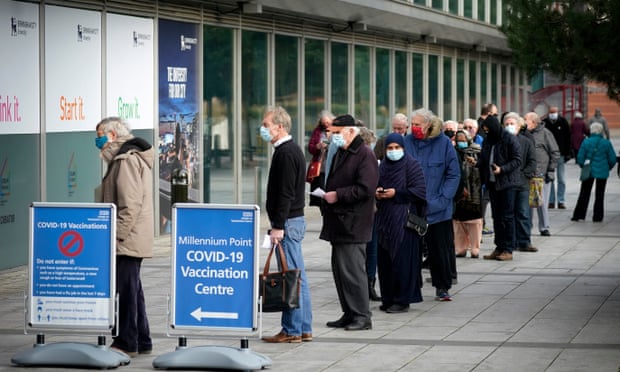But Prof Adam Finn says increase in infections unlikely to stop vaccine’s impact on hospitalisations
Covid infections could rise as a result of the delay in people in their 40s and younger getting their vaccinations, a member of the Joint Committee on Vaccination and Immunisation (JCVI) has conceded.
Adam Finn, who advises UK health departments on immunisation and is a professor of paediatrics at the University of Bristol, told BBC Radio 4’s Today programme that vaccination of those aged under 50 “may kick off slightly later than we’d optimistically hoped”.
The delay, he said, “could have an effect on infection rates because as we move down through the population, that’s really where the impact lies.
“In terms of hospitalisation though, that’s really about phase 1: there are younger people being hospitalised with Covid but many fewer than we see in over-50s. So as long as phase 1 gets done as completely as we’re hoping it to, we really should see the impact on hospitalisations continue.”
A delay in the delivery of 5m doses of the AstraZeneca coronavirus vaccine from India is partly to blame for a forthcoming reduction in the UK’s supply.
Finn said the current aim was to complete priority groups 1-9 (aged 50 and above plus those with health conditions) but also “to deliver on those second doses because JCVI has been very clear from the outset that those second doses must be given in order to provide the long-term protection that people need”.
He said the 12 weeks between first and second doses must “not be allowed to slip significantly and I think it may mean that the next phase, phase 2 [under-50s], may kick off slightly later than we’d optimistically hoped”.
Robert Jenrick conceded that the rollout of vaccines would held up for around four weeks because of the shortage.
The housing secretary told BBC Breakfast that the final goal of administering the first dose of a vaccine by the end of July was still on track. “We have every reason to believe that supply will increase in the months of May, June and July,” he said.
The government learned of coronavirus vaccine supply issues “in the last few days”, said Jenrick, although he refused to comment on whether the shortage was due to reductions from a single nation.
The Serum Institute of India denied there was any delay in delivering vaccines, claiming there had been no agreed timeframe to deliver a second tranche of 5m doses, a source authorised to speak for the facility told the Guardian.
They said the Indian government had to give approval for exports and its permission depended on the situation in the country, which has significantly changed in the past fortnight.
After a slow start, India’s vaccination programme has more than doubled the number of doses it is administering each day compared with last week, which in turn is likely to have increased its demands on the Serum Institute’s supply.
The country’s rate of new Covid-19 cases has also begun to rise again in recent weeks after falling steeply for the past five months, bucking hopes that the pandemic had permanently receded and raising pressure on the Indian government to ensure it can meet its own needs before sending doses overseas.
India has sold or gifted about 59m vaccine doses abroad compared with the 37m it has administered at home, with another 38m distributed to state governments and awaiting use. Indians have largely backed the government’s programme of “vaccine maitri” (vaccine friendship), but foreign minister, S Jaishankar, told parliament on Wednesday that exports and donations were “based on the assessment of adequate availability at home”.
AstraZeneca has partnered with the institute, which is the world’s largest vaccine manufacturer, to supply the Indian government and other countries, including low- and middle-income ones.
The European Medicines Agency is due to deliver its verdict on the safety of the AstraZeneca vaccine after more than a dozen European countries halted its rollout over fears regarding blood clots.
… as you join us today from Turkey, we have a small favour to ask. Through these turbulent and challenging times, millions rely on the Guardian for independent journalism that stands for truth and integrity. Readers chose to support us financially more than 1.5 million times in 2020, joining existing supporters in 180 countries.
For 2021, we commit to another year of high-impact reporting that can counter misinformation and offer an authoritative, trustworthy source of news for everyone. With no shareholders or billionaire owner, we set our own agenda and provide truth-seeking journalism that’s free from commercial and political influence. When it’s never mattered more, we can investigate and challenge without fear or favour.
Unlike many others, we have maintained our choice: to keep Guardian journalism open for all readers, regardless of where they live or what they can afford to pay. We do this because we believe in information equality, where everyone deserves to read accurate news and thoughtful analysis. Greater numbers of people are staying well-informed on world events, and being inspired to take meaningful action.
In the last year alone, we offered readers a comprehensive, international perspective on critical events – from the Black Lives Matter protests, to the US presidential election, Brexit, and the ongoing pandemic. We enhanced our reputation for urgent, powerful reporting on the climate emergency, and made the decision to reject advertising from fossil fuel companies, divest from the oil and gas industries, and set a course to achieve net zero emissions by 2030.
If there were ever a time to join us, it is now. You can power Guardian journalism and help sustain our future. Support the Guardian from as little as €1 – it only takes a minute. If you can, please consider supporting us with a regular amount each month. Thank you.
